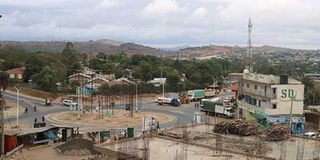Moyale town: From trouble hot spot to a robust trading hub

An aerial view of Moyale town in Marsabit County. The town is quickly growing with promises of becoming one of the biggest economic havens in Northern Kenya after years of stagnation. PHOTO | JACOB WALTER | NATION MEDIA GROUP
What you need to know:
- The town has also seen a huge growth of the hospitality industry.
- It is now popularly known as Moyale Raha to mean a hub of leisure.
- However, lack of street lighting exposes the town to a lot of unforeseen security risks.
After lean economic times caused by ethnic clashes in the early 2000s, coupled with banditry and frequent cycles of drought, Moyale town in Marsabit is readying itself for better times.
Popularly known as Moyale Raha to mean a hub of leisure, the town that borders Ethiopia is currently basking in stable security and robust trade.
This stability is reported to be the culmination of intensified security patrols and intelligence operations in the town done by the Kenyan government since February this year.
TROUBLE HOT SPOT
Just like any other frontier town, Moyale is very busy and for many years, it was legendary as Kenya’s trouble hot spot.
Perhaps, what has not changed is the harsh climatic conditions, but choking under decades of sectarian fights and the hallucination of secessionist struggles right from the colonial days, Moyale has undergone unprecedented metamorphosis.
The town is home to people from all walks of life and is inhabited by different communities.
It thus enjoys a towering stature compared to other border towns in the country.
ETHIOPIA
Another factor attributed to the peace now being enjoyed in the region is the change of regime in neighbouring Ethiopia since August 2018.
Ethiopian Prime Minister Abiy Ahmed has shown a knack for balancing reforms, continuity in his country and improving bilateral relations with Kenya since he took office.
Marsabit Governor Mohamud Ali lauded the security apparatus for containing insecurity in the once turbulent town.
He commended the security agencies for stumping out the once rampant daring robbery sprees that characterized the town earlier in the year.
COMMENDABLE WORK
“I thank the security officers for the commendable work they are doing in Moyale town for transforming the town into a peaceful place and also flushing out criminals who were troubling peace, out of the town,” Governor Ali said.
The governor also urged residents of Moyale to co-exist harmoniously with their neighbouring Ethiopians, adding that the town is strategically placed as a regional transit hub.
According to Marsabit County Commissioner Gilbert Kitiyo, a series of peacekeeping delegations that have since brought together representation from both Kenya and Ethiopia governments have been successful.
VIGILANT
“The Ethiopian security commands never take chances whenever we raise issues about some of their citizens crossing the border to commit crime on our land. They deal with them ruthlessly,” Mr Kitiyo said.
Marsabit Police Commander Steve Oloo told the Nation that security officers are always vigilant.
Galmo Boru, who operates an M-Pesa shop and an agency for local commercial banks in Moyale Town told the Nation that since the residents resolved to stop ethnic animosity, business has picked up.
The town is currently the biggest revenue generator in the county due to robust trade.
It has also received a boost of tarmacked roads and streets.

Al-Yussra hotel, one of the executive resort centres in Moyale town. PHOTO | JACOB WALTER | NATION MEDIA GROUP
HOTELS
The town has also seen a huge growth of the hospitality industry with a number of hotels like Jirime Resort and Alhusbra owing to an increased number of visitors.
However, lack of street lighting exposes the town to a lot of unforeseen security risks.
The Nation’s background check established that all street lights are not operational, plunging the entire town in total darkness at night.
The town is also faced with acute water shortages with the residents at times depending on the Ethiopians who sell water across the border using donkeys.
A teacher in one of the schools in the town who sought for anonymity told the Nation that they are forced to forgo meals when they totally fail to get water from the vendors.





